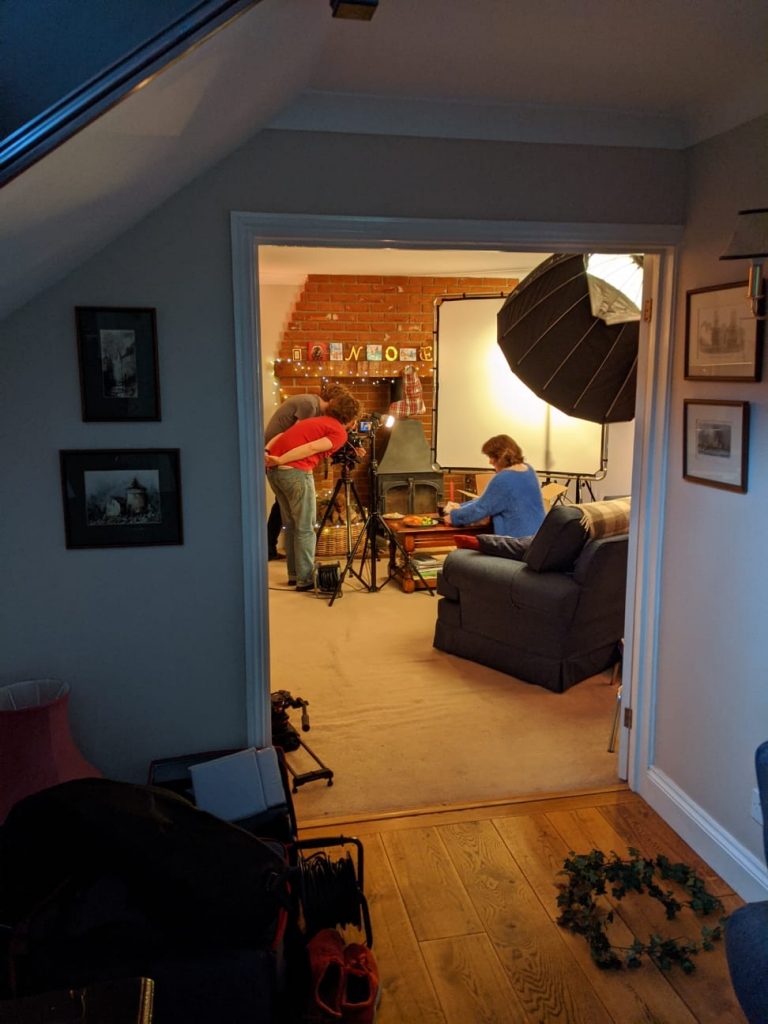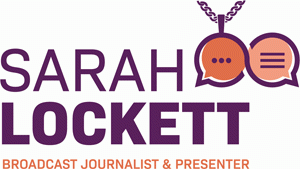Christmas came early for me in October when I took part in a TV ad for the sustainable accessories company FromBelo. Here’s a Behind-The-Scenes pic, plus the YouTube link.

The shoot reminded me of the need for teamwork in TV. When I started out as a BBC local radio reporter, I researched, arranged, taped and edited the interviews, wrote the script, recorded the script in a studio (on reel-to-reel tape!), edited the tape, packaged it up and left it overnight for the morning producers to play in to the breakfast show. It was all me, from the moment the idea was allocated to me by the programme producer.
In TV, I soon realised it was very much a team effort. I couldn’t create graphics, edit video, light a studio/location, record sound properly, operate a camera, run a sat-truck, or any of the other gazillion things that need to be done to make a TV news programme. I had to do my bit BUT rely on a lot of other people to do their bit – all experts in their field, all dotting the i’s and crossing the t’s on their little piece of the puzzle.
So, I thought I’d say a few words about teamwork. Now, it’s good to be able to do a lot of different things, to be an all-rounder. But equally, the older I get, I know I am very good at some things, reasonably passable at others, and only just functional at others. So it’s better to get other people to do those bits – for my stress-levels and the client’s finished result. So, what does it take to work effectively as a team? Received wisdom seems to say: 7 things.
Communication: when you’re working in a team, it stands to reason that you’re not all doing the same thing; you may not even know/understand precisely what the others are doing. You’re doing your bit, and they’re doing… something else! You can’t oversee, minute-by-minute, everything they’re doing. So you need to communicate effectively. Who’s doing what? Who’s in charge of what? Who’s struggling? Who needs help? Just a text or a WhatsApp will let everyone know where you are. On a recent job, my team and I couldn’t communicate for the first few days. Our mobile phones were taken off us. Some of us had landlines, some of us didn’t. We had to walk several hundred yards to find the rest of the team to ask simple questions. It was not good. Eventually we created a system (begged a landline phone, ordered a 20-metre extension cord from Amazon, took breaks to go down and access our mobiles etc). Eventually we could communicate and collaborate. Phew.
Leadership – this is something I am perhaps not great at – I’m too nice! Which may come as a surprise to some of the people I work with – I’ve recently been told I was a hard taskmaster and brusque – surely not! Maybe they were just snowflakes?! Anyway, a team needs a leader, and one of their tasks is to set manageable goals for the other members, keep them on track to achieve those goals, and stretch them to achieve things they maybe thought they couldn’t. I tend to play safe because I want to submit a product that is on-time and finished. This goes back to my early days working in broadcast news. It’s no good having something fantastic that’s 10 seconds too late! When the bongs go, you have to read your headlines, no matter what. But when we have a bit more time to play with, it’s good for me to be stretched/stressed, to get a better product out. And I need a leader to tell me I can do it!
Time Management – We all know colleagues who, when asked how long something will take, reply, “It’ll take as long as it takes!” Funny! But the rest of the teams needs something a bit more definite than that. So, part of teamwork is meeting the deadlines you’ve been set – or set yourself – or keeping the boss informed IN GOOD TIME if it’s not going to make.
Problem-solving: on a recent job, my team had a lot of logistical challenges outside of our control, which meant we had to reverse-engineer our processes to fit into those limitations. My colleague told me the phrase, “You can only p*ss with the c**k you’ve got”. So, we only had certain materials, people and technology at our disposal and we had to “cut our coat according to our cloth,” to use a slightly more erudite expression. But it did mean we came up with new ways of working, new internal deadlines, new restrictions that we imposed on ourselves – and we had to resist calls from the client to do more. It was absolutely not possible considering the restrictions we were working under! You’ve got to be harsh, firm but fair. And problem-solve so that you can at least deliver something.
Listening: (see Communication) In a team, yes you need to concentrate on your bit, your “deliverables”, but in addition to this: do listen, hear and absorb the others’ points of view, issues and problems – to help find a solution, or at least know why they’re struggling.
Collaboration: You can learn from those colleagues/team-members who are doing something slightly different from you (when you eventually get some downtime – you can’t work at a million-miles-an-hour indefinitely). Hopefully, on each project, you’ll get some time to learn, talk and acquire new skills. This makes you a better team-member in the long run.
Critical Thinking: what is critical thinking? Criticising?! No. It’s basically about not necessarily following the herd : thinking around a problem to find a solution, listening to all members of the team because someone unexpected may come up with something brilliant. On the other hand, the leader is the leader: it’s their train set, so ultimately – what they say goes.
So, I hope I’m a good team player, not too much of a diva, and don’t try to micro-manage my colleagues too much. I do my bit, demand only moderate praise/adoration, and dole out accolades when they’re due. If I’ve worked with you recently, you’re all wonderful!

